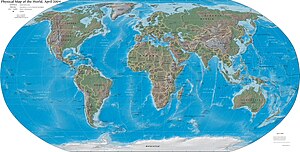Geography
Geography is the study of the Earth and its features, its inhabitants, and its phenomena.[1] The word geography comes from the Greek words gê ("Earth") and graphein ("to write, draw"). It means "to write and draw about the Earth". The word was first used by a scientist called Eratosthenes (276-194 B.C.).
Its features are things like continents, seas, rivers and mountains. Its inhabitants are all the people and animals that live on it. Its phenomena are the things that happen like tides, winds, and earthquakes.
A person who is an expert in geography is a geographer. A geographer tries to understand the world and the things that are in it, how they started and how they have changed.[2]
Geography is divided into two main parts called physical geography and human geography. Physical geography studies the natural environment and human geography studies the human environment. The human environmental studies would include things such as the population in a country, how a country's economy is doing, and more. There is also environmental geography.
Geographers need to know a lot about maps because maps are very important for understanding geography. Geographers use maps a lot, and often make them. Making maps is called cartography, and similarly, people who make maps are cartographers.
Contents
Branches[change | change source]
Physical geography[change | change source]
Physical geography (sometimes also called physiography) is the natural science that covers the natural environment and the Earth's surface. A geographer studying physical geography may look at:
- Biogeography
- Climatology
- Landscape ecology
- Geomorphology
- Glaciology
- Hydrology
- Meteorology
- Oceanography
- Palaeogeography
- Pedology
Human geography[change | change source]
Human geography is the social science that covers the study of people and their communities, cultures, economies and their interaction with the environment. Geographers studying the human environment may look at:
Related pages[change | change source]
References[change | change source]
- ↑ "Geography". The American Heritage Dictionary/ of the English Language, Fourth Edition. Houghton Mifflin Company. Retrieved October 9, 2006.
- ↑ "Geography: The Mother of Sciences" (PDF). Archived from the original (PDF) on 3rd October 2008. Check date values in:
|archivedate=(help)
Other websites[change | change source]
- Geography Trainer 1.3 - Educational game aimed at school children
- www.geoknow.net - Geography resources at your fingertips!
- PopulationData.net
- PopulationMondiale.com
- Using Literature To Teach Geography in High Schools. ERIC Digest.
- Teaching Geography at School and Home. ERIC Digest.
- The National Geography Content Standards. ERIC Digest.


